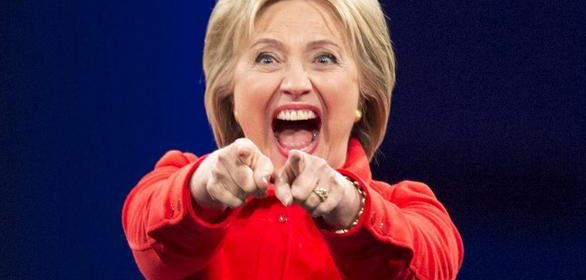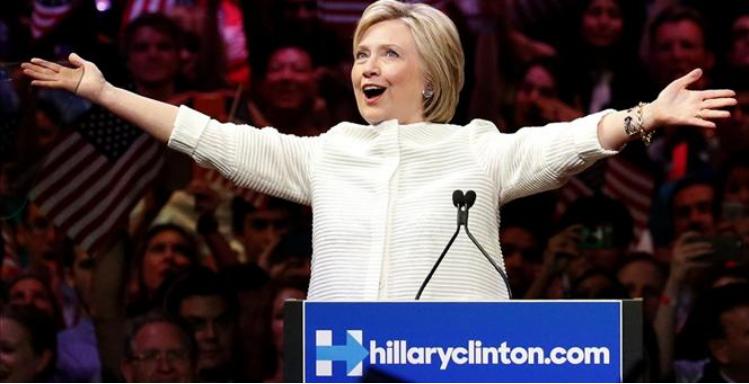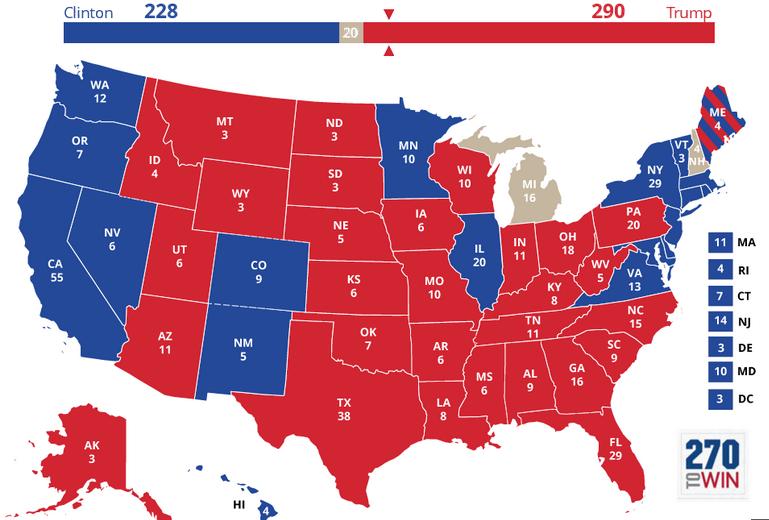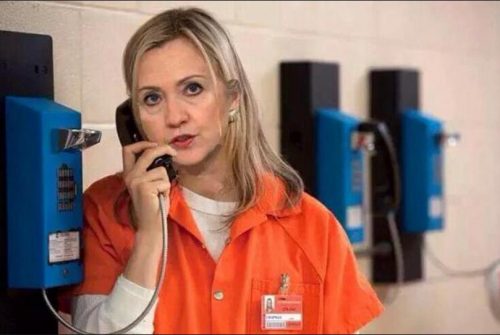“Hillary Clinton told a joke. Speaking to a roomful of Goldman Sachs bankers in June 2013, Clinton said that Goldman CEO Lloyd Blankfein could leave the Wall Street firm that’s made him a billionaire to start a soup kitchen:

This exchange was written down by Clinton’s aides as they gathered information on what parts of her paid Wall Street speeches could prove damaging should they leak to the press. Her team filed it under the heading, “AWKWARD.”
This “AWKWARD” quote and hundreds of other previously hidden nuggets about Clinton have spilled out into public view recently. Over the last two weeks, Julian Assange’s whistleblower platform WikiLeaks has published about 20,000 pages of emails illegally stolen from John Podesta, Clinton’s campaign chair.
The strangest thing about the ensuing uproar is that none of the Podesta emails has so far actually broken any fresh scandals about the woman on track to be the next president. Instead, they’ve mostly revealed an underbelly of ugliness to the multiple Clinton controversies that we’ve already known about: the questionable relationship between the Clinton Foundation and its donors, Clinton’s ease with powerful interests on Wall Street, her ties to wealthy campaign contributors.

The Goldman soup kitchen joke is a perfect example. If there’s one thing to really get mad about here, it’s something we’ve known for years — that Clinton took millions from big Wall Street banks right before running for president. Seeing her and Wall Street titans share a laugh about helping the hungry might turn your stomach, but the most important question — was it wrong for Clinton to take big checks from Goldman right before running? — is in no way new. (Clinton’s campaign refused to comment on individual emails, instead blaming the Russians for hacking the emails and providing them to WikiLeaks.)
This is, from what we’ve seen so far, the real story of WikiLeaks’ Podesta emails. Yes, they have not found any major “bombshells.” No, they’re not going to sink Clinton’s campaign. But by filling in the storylines that have long dogged her campaign with new and vivid detail, we are getting our clearest picture yet of how the sausage — or, if you prefer, the creamy risotto — gets made in Clinton-world.
It can be an ugly sight.
What are the ‘Podesta Emails‘ and what do they show?
I’ve now read hundreds of the Podesta emails, as well as upward of 60 stories from across left-wing, mainstream, and conservative media outlets about what they entail.
I should stress that what I’ve found is far from all bad. Dozens of these emails show Clinton’s team genuinely striving to discover the correct position on an issue. Many of them show real, determined efforts to find the right solution to some public policy crisis. In general, especially compared to the vicious infighting that characterized her 2008 presidential run, you come away from the Podesta emails thinking that Clinton has assembled an admiringly loyal group of aides that believes in the candidate and the mission of the campaign. There’s some backbiting, but you could imagine far, far worse.
Then there’s the other stuff — the emails Podesta presumably wish never leaked. To help make sense of what we’ve learned, I’ve broken out the interesting new bits into what I think can be more-or-less characterized as four distinct categories:
- Questions around the Clinton Foundation: This is the smallest category of emails. But a surprising revelation about Qatari officials and a newly discovered Clinton Foundation audit help validate fears that foundation donors likely received “special access.”
- Clinton’s ties to Wall Street, big donors: Hundreds of other emails also highlight Clinton and her team’s much-discussed connections to Wall Street and big money. They reveal a Clinton certainly more sympathetic to these unpopular actors than she would presumably be on the campaign trail.
- How the Clinton campaign machine works: The emails also provide a virtually unprecedented look inside the architecture of the Clinton campaign — how proposals get passed up to the candidate, for instance. They show the campaign heavily weighing “political” considerations before endorsing certain policies, but also interested in seeking real solutions.
- Political gossip and Clinton-world squabbling: This category includes a lot of normal office whining and sniping about Clinton-world enemies. It’s certainly interesting, especially for political junkies. But it also has the least relevance for discussions of public policy.
Vox reached out to the Clinton campaign for comment, and spokesperson Glen Caplin replied that they are “still not authenticating any individual emails.” The campaign also referred foundation-related questions to the foundation itself, and referenced several times that the leaks were tied to a “Russian attempt to influence our election.” As it has to other reporters, the Clinton campaign did not dispute the accuracy of any of the individual emails.
We should be clear that these Podesta email leaks have nothing to do with the multiple other “Clinton email” scandals percolating over the past few years. So they aren’t, as some news outlets have incorrectly reported, related to the FBI investigation into Clinton’s private server or allegations that she went around transparency laws.
Instead, since these emails emerge from the private account of Clinton’s campaign chair, they tend to tell us far more about candidate Clinton than they do about Secretary of State Clinton.
Storyline No. 1: Leaked emails confirm Clinton Foundation blurred public/private lines
There is, however, one exception to that general rule: the Clinton Foundation.
Since the campaign began, the Clinton Foundation has been at the center of an intense debate. The most extreme critics, like Donald Trump, have alleged that Clinton used the state department to transactionally reward the charity’s donors (there’s no evidence for that). Meanwhile, the campaign and foundation have fallen back on one consistent defense — that there’s been no proof of a quid pro quo between donor and foundation.
The Clinton Foundation really did do inarguably life-saving work. But good government experts have argued that the Clintons accepted private donations in a way that they should have known would have created dangerous conflicts of interest. This more nuanced attack faults the Clinton Foundation for dangerously blurring the distinction between private and public.
The Podesta leaks back up that story.
One way it does so is by uncovering a private audit conducted by a widely-respected New York City law firm. The review concluded that the Clinton Foundation’s board had failed to oversee potential conflicts of interest, and that some donors expected “quid pro quo benefits.” “Interviewees reported conflicts of those raising funds or donors, some of whom may have an expectation of quid pro quo benefits in return for gift,” the audit found.
It’s not clear they received them. but either way the audit is a striking confirmation that even the attorneys hired by Clinton recognized the danger in the relationship between donor and foundation.
Then there’s another disclosure emerging from the Podesta emails: that Qatari officials sought to present Bill Clinton with a $1 million gift on his birthday on during his wife’s tenure as secretary of state. As the New York Times noted, this revelation suggests that foreign governments were able to gain an audience with Bill Clinton in exchange for a check. (The Times couldn’t confirm if the $1 million check was ever cashed.)
The last revelation in the leaks about the foundation may also be the most unusual: Chelsea Clinton apparently was running around raising the alarm bell over possible conflicts of interest, suggesting the Clintons themselves were aware of the potential problems. (Politico’s Kenneth Vogel has a detailed blow-by-blow of Chelsea’s concerns over the overlapping roles of a consulting firm named Teneo.)
Nothing here represents a major revelation. If you weren’t bothered by the Clinton Foundation before, this probably isn’t going to trouble you. But if you were, having an audit and Chelsea Clinton share your fears will fuel the sense that something suspicious was afoot here.
Storyline No. 2: Disclosures detail Clinton’s coziness with Wall Street and top donors

Over the course of the election, Donald Trump and Bernie Sanders leveled a similar critique of Clinton: that she’s too wedded to the “political establishment.”
For Sanders, that usually meant that Clinton didn’t have the independence to challenge powerful actors on Wall Street and in Washington, DC. Trump has used similar rhetoric, going after “Crooked” Clinton for her big dollar campaign contributors.
Whatever you think of the merits of those attacks, it’s clear that the majority of the American people think it’s correct, at least in broad strokes. Seven in 10 voters consider Clinton part of the establishment. Just 30 percent trust her to take on special interests.
It’s an impression that the Podesta emails only deepen — even if they don’t provide ground-breaking new controversies around it.
Here’s just a few examples:
- At ease with Wall Street donors: The dump shows Clinton admitting to bankers her dream of a “hemispheric common market with open borders,” arguing the banks got too much blame for their role in the financial crisis, and generally speaking about them in far more glowing terms than you’d she would on the campaign trail.
At one point, she tells Goldman Sachs’s Blankfein that “there is such a bias against people who have led successful and/or complicated lives:”

In another, Clinton praises Wall Street bankers as people who “see over the horizon:”

Clinton also says the Obama-era Dodd-Frank act had to be passed “for political reasons,” and seemed to knock the press for foisting blame for the financial crisis on Wall Street:

Clinton also told the bankers that she thought they were the ones best suited to regulate themselves, since “the people that know the industry better than anybody are the people who work in the industry:”

Even well into the early days of the campaign, Hillary Clinton didn’t seem to appreciate the depths of voters’ frustration with Wall Street. Bill Clinton wanted to give a speech just three days into his wife’s candidacy, and an email from Clinton aide Huma Abedin suggests Hillary was okay with it. Another Clinton aide, Robby Mook, had to essentially beg Bill Clinton not to give the speech by citing extensive polling numbers about how damaging it would prove:

Again, nobody expected Clinton to go into these speeches guns blazing and accuse the bankers of crashing the global economy with their greedy recklessness. But for those who think that relationship is fundamentally wrong, hearing Clinton flatter the bankers — and fail to recognize why people would object to her husband taking their money — may be jarring nonetheless.
- Covert military action: At one point in the leaked Wall Street speeches, Clinton admits to yearning for the days where the American military could secretly intervene abroad without the press finding out. She appears to lament that government employees now “can’t help themselves” before exposing American operations abroad:

Few peaceniks will be shocked to hear that Clinton might be more hawkish than the rest of her party. But actually reading that she told a private room of Goldman bankers that she thinks America’s military should “intervene as covertly as is possible” may still be alarming.
- Relationship with Super PACs: Since they were legalized by the Supreme Court in 2010, Super PAC groups have emerged to spend on behalf of presidential candidates. They’re not supposed to directly coordinate with the candidates’ campaigns themselves.But some WikiLeaks emails, first highlighted by the Intercept, suggest that the Clinton campaign worked with Correct the Record, a Super PAC run by longtime Clinton ally and Media Matters founder David Brock. (The Intercept says a complaint has been filed against Correct the Record for possible campaign finance law violations.) Below, here’s a Clinton’s staffer planning to talk to Brock to attack Ed Klein, who has written books that attack Clinton.

- Blunt exchanges about working with donors: In another set of the Podesta emails, Clinton’s team spoke in frank terms about whether or not to accept donations from lobbyists from foreign countries.”I’m ok just taking the money and dealing with the attacks,” writes Robby Mook, Clinton’s campaign manager. Jennifer Palmieri, Clinton’s campaign manager, added “Take the money!!”In the same exchange, longtime Clinton aide Dennis Cheng wondered how the campaign would deal with telling the lobbyists that they wouldn’t be accepting their money but accepting those from corporate lobbyists:

The campaign’s relationship with donors is a recurring theme in the Podesta leaks. In another email, Clinton staff asked Israeli philanthropist Haim Saban, the billionaire chairman of Univision Communications, if he approved Clinton campaign language about the BDS boycott against Israeli goods. (Saban has helped raise more than $5 million to Clinton’s campaign, according to Mother Jones.)

Of course, when Palmieri writes “take the money!!” she’s being partially facetious. But it’s an attitude those who fear money’s corrupting influence in politics will be alarmed to see.
Again, none of this is revelatory. Nobody who has closely followed Clinton will be shocked to find her campaign was attuned to the wishes of donors. Her affinity for Israel is well known. Critics of her approach to campaign finance are mad about the decision to take money from big donors — not the internal discussion over whether or not to do so.
But watching how all of this unfolded — seeing for yourself how Clinton spoke gently to Wall Street — won’t make the disclosures any easier for her detractors to swallow. It’s a confirmation of what we already know, but that doesn’t make it any less astonishing, at least for Clinton’s critics.
Storyline No. 3: How the Clinton campaign functions



 CIA, NSA, FBI…just investigate this shameless one properly!
CIA, NSA, FBI…just investigate this shameless one properly!




